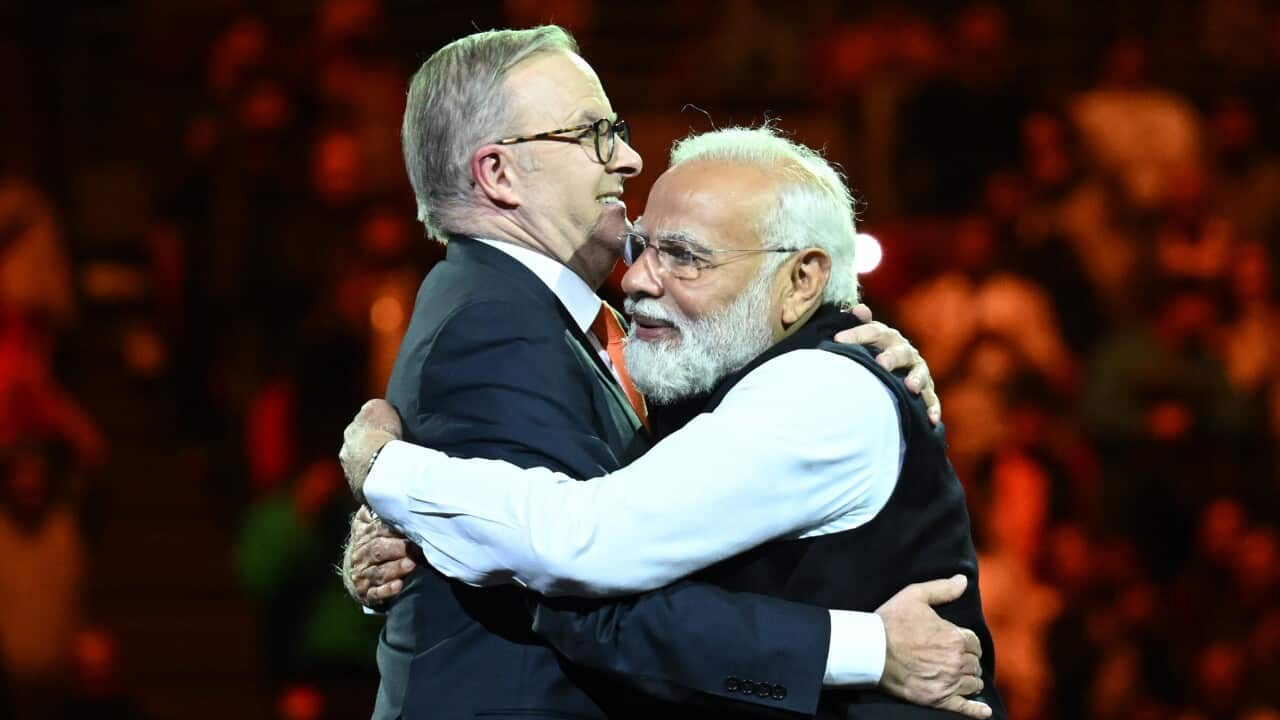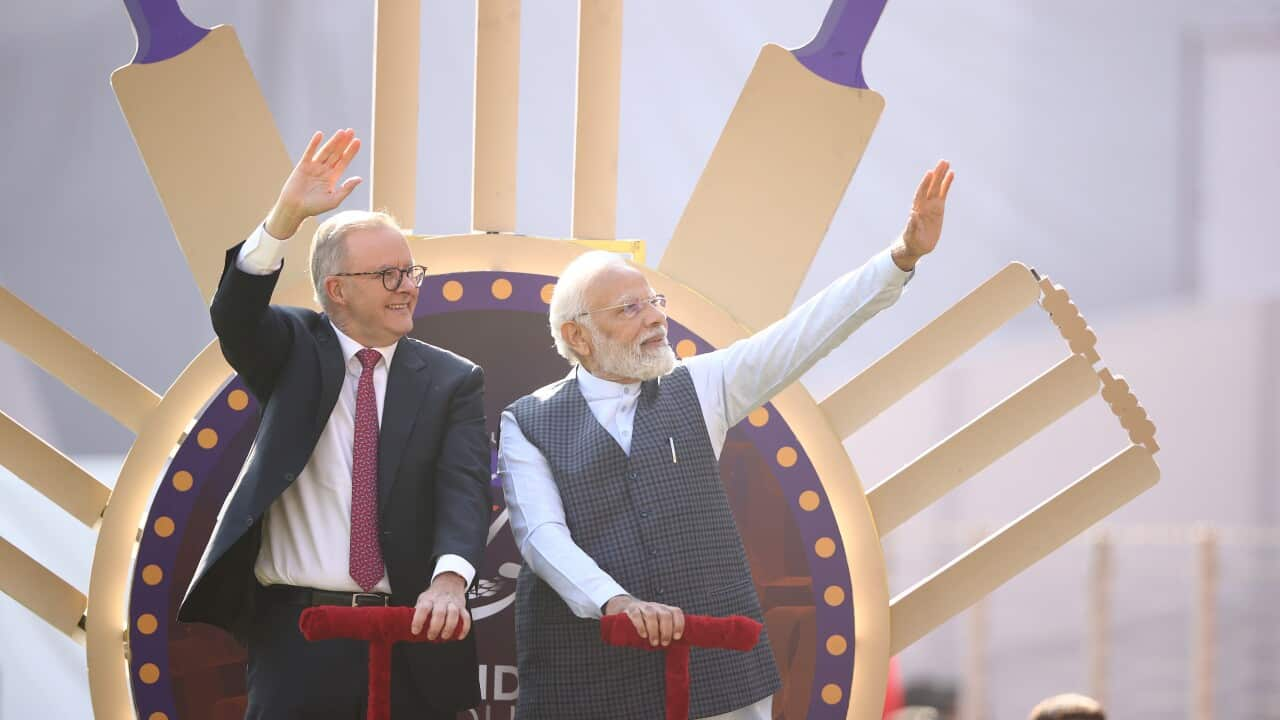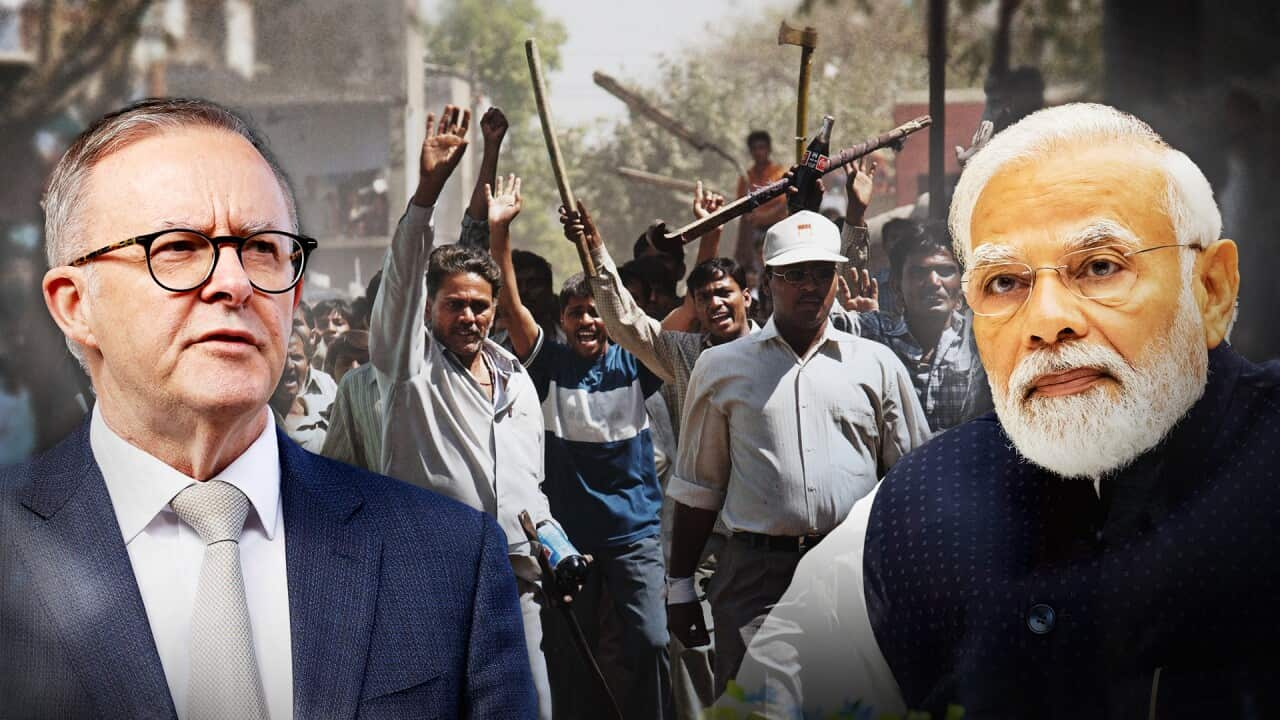Key Points
- Anthony Albanese has pushed back against Narendra Modi being labeled a 'tyrant'.
- Mr Alabense introduced the Indian PM to a raucous crowd on Tuesday.
- The pair have announced deeper ties after talks on Wednesday.
Prime Minister Anthony Albanese has rejected suggestions he appeared on stage with a "tyrant" the day after attending a rally with Indian Prime Minister Narendra Modi, describing India as a "great democracy".
Neither leader mentioned human rights issues in India after emerging from talks in Sydney on Wednesday morning, though Mr Modi did repeat concerns over in Australia, saying Mr Albanese had assured him "strict actions" would be taken.
Neither leader took questions from journalists.
Mr Albanese introduced Mr Modi to a rapturous reception of roughly 20,000 members of Australia's Indian diaspora community at Sydney's Olympic Park on Tuesday night, labelling his counterpart "the boss".

Neither leader took questions after the meeting, though Mr Modi repeated concerns over vandalism of Hindu temples in Australia. Source: AAP / Dean Lewins
Mr Modi is an extremely popular figure in India, credited by his supporters with facilitating an economic boom. But he has , who say his ruling Bharatiya Janata Party (BJP) is targeting the country's Muslim and Sikh minority populations, and weaponising India's legal system to crack down on dissent.
Under his leadership, India has plummeted to 161 out of 180 countries on the World Press Freedom Index, which cited increasing violence against journalists and politically-partisan media.
India's main opposition leader Rahul Gandhi was also for defamation over a comment directed at Mr Modi, something Human Rights Watch has urged Mr Albanese to raise with his counterpart during the visit.
Anthony Albanese rejects 'tyrant' label
Asked on Channel 7's Sunrise whether those factors made Mr Modi "a bit of a tyrant", Mr Albanese lauded his counterpart for India's "extraordinary" economic growth which he said had uplifted its citizens.
"India is of course the world’s largest democracy ... Prime Minister Modi is certainly popular, not with everyone, it’s a democracy, but he’s popular with a majority of people," he said on Wednesday morning.
The BJP is widely viewed as running a right-wing Hindu nationalist agenda - India is majority Hindu - despite a history of plurality and secularism embedded in the country's political system.

India's Prime Minister Narendra Modi inspects a military parade during a bilateral meeting at Admiralty House in Sydney on Wednesday. Source: AAP / Saeed Khan
On Wednesday, Mr Albanese insisted "it’s not up to me to pass a comment on some of the internal politics" of India.
"There’s no doubt that [India] is one of the success stories in the world," he said.
Emerging from talks
After talks later in the morning, Mr Albanese revealed the pair were pushing ahead on a green hydrogen partnership and had struck a migration and mobility partnership to facilitate better mobility of students and academics.
There was no direct mention of human rights issues in India, but Mr Modi described "democratic values" as the cornerstone of the relationship.
Mr Modi again referenced vandalism of Hindu temples in Australia, having used a joint press conference in India in March .
"We will not accept any elements that harm the friendly and warm ties between India and Australia by their actions or thoughts," he said.
"I thank the prime minister for the actions that have already been taken. Prime Minister Albanese has once again assured me today that he will take strict actions against such elements in the future also."
Australia will also establish a new consulate-general in India, while plans for an Indian equivalent in Brisbane are in train.
Anthony Albanese to attend G20 in disputed Kashmir
Mr Albanese also confirmed he intends to attend the G20 leaders summit in September, which will be hosted in the disputed territory of Kashmir, over which both India and Pakistan claim sovereignty.
China and Saudi Arabia this week boycotted G20 tourism working group talks in the Muslim-majority territory, which Mr Modi's government controversially stripped of semi-autonomy in 2019.
Indian authorities say the meetings are an opportunity to demonstrate the "peace and prosperity" brought to the region by the changes.
Greens senator David Shoebridge urged Mr Albanese to "hear more than just one voice from the diaspora", saying many Indian-Australians held "real concerns" over the location.
"Our government should be speaking truth to a friend, and say to that friend: it is not right to bring international leaders in the G20 into that disputed territory," he said.
New centre for Australia-India relations
The two prime ministers were constantly cheered at the Olympic Park rally on Tuesday night.
Mr Albanese has also announced a new centre for Australia-India relations for Parramatta in Sydney's west, which he said would be "a place that itself is a testament to the vitality of the Indian-Australian experience".
"We want to see more connections, more Australian and Indian students living and studying in each other's countries and bringing those experiences home."
The prime ministers also unveiled a plaque for the foundation stone of the.
A roaring crowd of about 20,000 members of Australia's Indian community attended the stadium to welcome Mr Modi, in what marked his first visit in 10 years and the prime ministers' sixth meeting in 12 months.
"I said to my friend, the Prime Minister [Narendra Modi] before, the last time I saw someone on the stage here was Bruce Springsteen, and he didn't get the welcome that Prime Minister Modi has got," Mr Albanese told the crowd.
"This is a relationship we need to invest in," Mr Albanese told parliament on Tuesday.
"We have a rich friendship and a very affectionate sporting rivalry.
"We are both part of a growing, dynamic region and Prime Minister Modi is a very welcome visitor to our shores."
Mr Albanese also credited the Indian diaspora living in Australia, including about 700,000 people born on the subcontinent, for strengthening the local democracy.
"They have brought the spirit of the world's largest democracy to Australia and helped make our democracy stronger and more inclusive," he said.
Narendra Modi meets with mining magnates and celebrities
As crowds gathered outside the Sydney SuperDome hours before the rally, Mr Modi met business leaders including mining billionaires Gina Rinehart and Andrew Forrest.
He discussed infrastructure investment in India and how Australia manages retirement pensions with Paul Schroder, the head of the country's largest superannuation fund, Australian Super.

Entertainers perform ahead of the arrival of Anthony Albanese and Narendra Modi at a rally in Sydney on Tuesday night. Source: AAP / Dean Lewins
"I was humbled to be able to discuss many things, including my mother’s Indian heritage, how proud I am of my own Indian heritage, as well as the arts and my music," Mr Sebastian wrote.
Sarah Todd, a finalist in the 2022 season of MasterChef, also shared a photo of her and the Indian prime minister.
'Two different situations' on human rights: Marles
Some wanted alleged human rights abuses in India to be on the agenda during Mr Modi's short visit here.
Human Rights Watch's Asia director Elaine Pearson has urged Australia to not to repeat the "same mistakes it made with the Chinese government by pursuing deeper trade engagement while sidelining human rights concerns".
Asked whether human rights should be on the agenda, Deputy Prime Minister Richard Marles said India was a large democracy that shared values with Australia.
"We have never had a greater strategic alignment with India than we do right now. Both countries are deeply invested in the collective security of the Indo-Pacific region," he told reporters in Canberra on Tuesday.
"And all of this is driving a much closer relationship between (the) two countries."
India has snubbed global calls to condemn Russia's invasion of Ukraine, with Moscow remaining a large arms supplier to New Delhi.
Mr Marles used a speech at a defence summit on Monday to say Australia needed to confront "inconvenient truths" with China, as Canberra works to balance competing trade interests with the possibility of military confrontation.
Asked whether the Indian relationship should be approached the same way when it came to calling out human rights abuses and crackdowns on freedom of speech, Mr Marles said the two nations were starkly different.
"We're talking about two very different situations," he said.
"We share values with India. India is a democracy.
"I'm not about to go through what will be said or not said in the conversation between our two prime ministers tomorrow, theirs is a very fulsome and open relationship."
Mr Modi last visited Australia in 2014 after the G-20 summit when Tony Abbott was prime minister.
- With AAP











